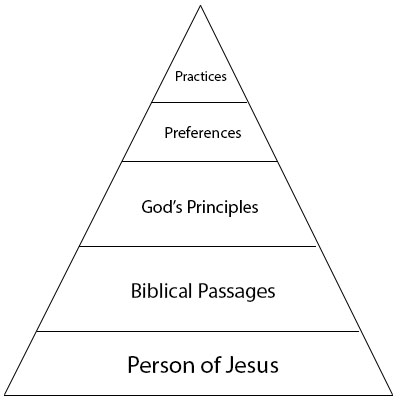We continue with our unity and diversity series. Below is the triangle that we are using in our study.
So we have looked in the last couple of weeks to the person of Jesus, we now move into the authority that provides the details of who Jesus is. The Bible is our central authority, and past the person of Jesus, it must be a source of unity inside God’s church.
When Peter talks about Jesus in this passage, he was accepting the truth of the Bible (this passage from the Old Testament.) God not only said that the Messiah would come. But in Jesus, that truth has come to pass. Belief doesn’t change the truth. The evidence for the truth of the Bible is overwhelming. So those who reject Jesus will stumble on Him as well as the Bible.
It was important for Peter to make clear what and who he was witness to. He was telling us what he saw. At the time, people were already trying to put Jesus in the category of fable or myth. The world would accuse Christians to fabricate some story to create a religion for power or influence. But what did that get them? It started with their property taken from them, then their families would disown them, and ultimately most were killed for their beliefs.
Remember we are looking at events of history, we can compile the evidence of the truth of the Bible. But what we will find is that the evidence for the reliability of the Bible is overwhelming.
#1. History Cannot Be Known
Really what someone is saying is that we cannot go back 2,000 years and see with our own eyes what happened. But then again, once everyone dies from a certain generation the same invalid argument can be made. But we can know the history based on all sorts of evidence. But if we look at the Bible as compared to other manuscripts of the time time, no other document can rise to the reliability level of the Bible. C.S. Lewis wrote a lot about this. He started his life as an atheist. He believed that if he really dug into the history of the Bible, he would be able to prove it wrong. But as the evidence mounted to the validity of the Bible, he was conflicted. He came to a point where he would have to make a decision of the truth in front of him. He chose to believe the Bible and follow Jesus.
#2. The New Testament Documents Contain Miracles
This stems from the rejection of the supernatural. If the supernatural occurs, the reality is gone according to these critics. This is actually being pushed from Christian pulpits today. But in Jesus’ day, the Bible doesn’t note that the critics of Jesus rejecting the miracles, but they instead went after Jesus because he performed these miracles on the Sabbath.
#3. The New Testament Writers Were Biased
Duh. Of course, they were biased. They were the followers of Jesus. But we can see by their writing that they were genuinely wanting to record the facts of Jesus’ life. But being biased doesn’t automatically mean that the documents they created were wrong. So when you look at a biased writer, what do you see in the writing? Did it embellish the truth, alter facts to make them appear “just right”? No, instead we see vulnerability. And we find that they wanted to push truth.
#4. Converted People Are Not Objective
We see time after time where the followers of Jesus are confused or questioning, of Jesus’ leading. They are cowards. They run when the Roman’s take Jesus away. They are doubters, continuing to question Jesus even after his resurrection. Women played important parts of Jesus’ story. They were important in his ministry and it was women who were the primary eyewitnesses of Jesus’ resurrection. Which in a culture that rejected women as valid eyewitnesses, would have been dumb to make women as the eyewitnesses. That is unless it was true.
Some skeptics will say, “Matthew could not be written for a hundred years because it is recorded that Jesus predicted the destruction of the temple. And Jesus couldn’t have known its destruction.” Can you hear the presupposition there? Jesus could not have known, so the writing could not be correct or written prior to the destruction of the temple. Only then could Matthew fabricate that prediction.
Below are active websites that continue to display research on the historical account of the Bible and Jesus’ life.
str.org
Stand to Reason
coldcasechristianity.com
Cold-Case Christianity with J. Warner Wallace
risenjesus.com
Risen Jesus the Ministry of Mike Licona
garyhabermas.com
This is a man who has done monumental research into the account of a risen Jesus.
bethinking.org
BeThinking
reasons.org
“Reasons to Believe” where science and faith converge.
6 For it stands in Scripture:
“Behold, I am laying in Zion a stone,
a cornerstone chosen and precious,
and whoever believes in him will not be put to shame.” (ESV)
16 For we did not follow cleverly devised myths when we made known to you the power and coming of our Lord Jesus Christ, but we were eyewitnesses of his majesty. (ESV)


